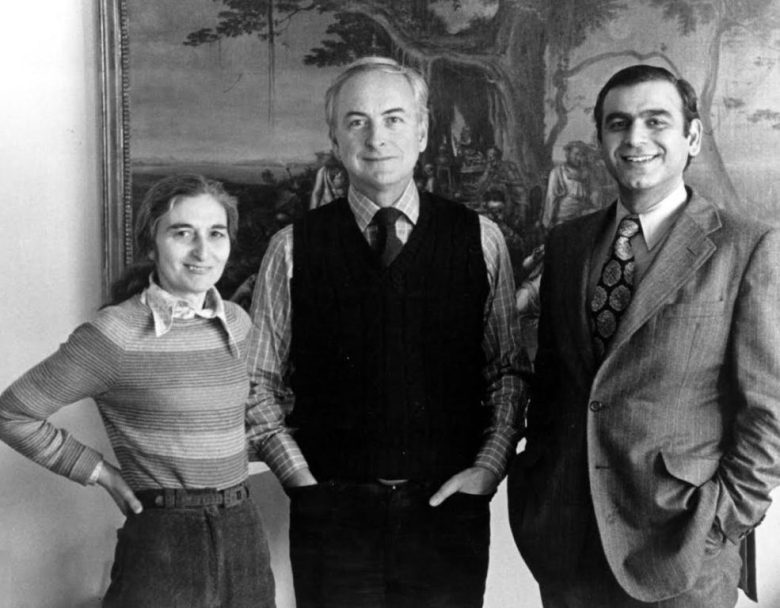‘Merchant Ivory’ Offers Inside Look at Outsider Filmmakers
The Guinness Book of World Records seems an unlikely place to find Merchant and Ivory (the filmmakers of posh costume dramas from the 1980s and ’90s) but the two are cited as having the longest collaboration (1961-2005) between a producer and director per their company Merchant Ivory Productions.
The documentary Merchant Ivory elaborates on the cinematic union between Ismail Merchant and James Ivory which immediately expanded with screenwriter Ruth Prawer Jhabvala. The late Merchant and Jhabvala speak to the camera via archival footage while the trio’s lone survivor Ivory offers contemporary comments.
Also featured are brief interviews with more than 40 collaborators including past cast members Emma Thompson, Felicity Kendal, Greta Scacchi, Helena Bonham Carter, Hugh Grant, James Wilby, Rupert Graves, Simon Callow, and Vanessa Redgrave who was named Best Actress by the National Society of Film Critics for playing Olive Chancellor, the leader of the women’s suffrage movement, in The Bostonians (1984).
Like Merchant Ivory’s The Europeans (1979) and The Golden Bowl (2001), The Bostonians is based on a Henry James novel. Yet the production team would achieve greater success with E.M. Forster works. Maurice (1987), which was released amid the AIDS crisis, gained praise from the then-LBG community thanks to the uplifting script by Ivory and Kit Hesketh-Harvey, who passed away in 2023. As such, this documentary is dedicated to him.
Jhabvala won Best Screenplay Oscars for her Forster-to-screen adaptions A Room with a View (1985) and Howards End (1992). As critical and commercial hits, each film received an Academy Award for Best Production Design. Despite the lavish-looking Edwardian sets, these movies were made on tight budgets.
While six-months pregnant, Jenny Beavan and her costume team of two had to dress 150 cast members for a scene in A Room with a View. After she picked up an Academy Award for her efforts, Merchant said, “Jenny, I got you your Oscar. Why do I now need to pay you?”
He wasn’t being cheap necessarily, just trying to keep the company afloat when backing had yet to materialize. The pence-pinching producer was a magician of sorts who wasn’t above keeping costs down by doubling as an accountant, driver, and cook on set.
According to Thompson, who took home the gold for Best Actress in Howards End (1992), Merchant would pay people on his early films with cash out of a paper bag. Alas, her leading man Anthony Hopkins would later sue for unpaid wages for the company’s last film, aptly-titled The City of Your Final Destination (2009).
A more rewarding collaboration remains to be The Remains of the Day (1993) which reunited Hopkins and Thompson. Based on Kazuo Ishiguro’s award-winning novel, this pre-Second World War drama is considered the peak of the company’s prestigious canon which includes Ishiguro’s The White Countess (2005), the last film Merchant would make before passing away.

Although known for English-set period pieces, Merchant Ivory Productions initially made films in and about India, from The Householder (1960) to Heat and Dust (1975), both based on Jhabvala’s novels.
Born in Germany in 1927 to Polish and Jewish parents, Ruth emigrated to Britain in 1939. When she married Cyrus Jhabvala in 1951, she moved to India. Eventually, she would become a naturalized citizen of the United States, where she lived from 1975 until her death in 2013.
Described as an “initiated outsider,” by American writer John Updike, Jhabvala is worthy of her own movie. Instead, her interesting life story and vast accomplishments (she’s the only writer to have a Booker Prize, a BAFTA and two Oscars) are only touched upon in the nearly two-hour documentary.
Understandably, the film focuses on Merchant and Ivory, who were more than professional partners. Along with their frequent collaborator, composer Richard Robbins, they blurred the lines between work and romance. While the men neither denied nor solely defined themselves as gay, their discreet private lives afforded them an outsider’s point of view that would inform the subject matter of their films which often dealt with free-spirits struggling to break free of societal restrictions and class barriers.
The fact that Ivory was an American working abroad and Merchant grew up in India’s partition period add to their outsider perspective. It’s no surprise that, with Jhabvala and Robbins, they formed their own kind of creative family working and living together. This message, and the testaments about Ivory’s calm and meticulous approach to filmmaking opposed to Merchant’s innovative and passionate presence, paint an endearing portrait.
What’s missing from Stephen Soucy’s overview are prominent filmmakers of today explaining how Merchant Ivory movies influenced them. Without this anchor, the documentary lacks a deserved gravitas. Nevertheless, it’s nice to visit with nonagenarian Ivory (who became the oldest Oscar winner for adapting the screenplay of 2017’s Call Me by Your Name) and recall the movies he made with Merchant and Jhabvala.
Merchant Ivory opens at the Gene Siskel Film Center today, and at the Landmark Century Cinema on September 6.
